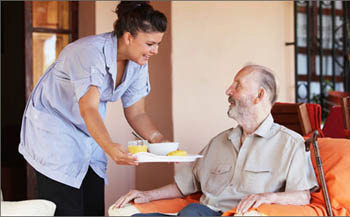
CNA and HHA: What’s the Difference?
Under the broad umbrella of professional care providers, there are several roles that industry workers fill. Among them are CNA’s and HHA’s.
Like most professions, the care sector has many acronyms to communicate the work that’s done and who does it. Today, we’ll look at the difference between CNA’s and HHA’s, two roles with many similar responsibilities, as well as a few important distinctions that you should know about.
CNA – Certified Nurse’s Aide
Usually known more simply as nursing aides/nurse aides, nursing assistants, or sometimes geriatric aides, a CNA offers hands-on care and takes on the standard care jobs assigned to them, typically by a nursing supervisor.
Exact tasks vary according to the needs of an individual patient, with the CNA undertaking several aspects of day to day care in a facility. These include:
- serving meals and helping a patient to eat,
- bathing and dressing patients, and helping them to start the day,
- administrative tasks such as delivering messages, placing calls, and providing necessary supplies,
- answering calls for help,
- making beds and tidying up rooms.
On the medical side, a CNA might be responsible for taking and recording a patient’s temperature, pulse rate, respiration rate, or blood pressure at scheduled times. Some nursing aides will help other medical staff members to move and set up equipment, as well as helping out with other standard care checks.
CNA’s are tasked with keeping an eye on the physical, mental, and emotional wellness of those in their care. They will report any unusual behavior or changes in condition to senior members of the nursing team
In essence, CNA’s are the primary eyes, ears, and care providers in the day to day running of a nursing facility.
HHA – Home Health Aide
In contrast to CNA’s, who primarily work in nursing facilities, HHA‘s live up to their name and help elderly, convalescent, or disabled persons in and around the patient’s home. Directed by their senior medical staff or nursing team, the home health aide provides services such as changing bandages, assisting with medical equipment like ventilators, offer massages, and administering oral medications.
Similar to nursing aides, home health aides may help out with the tasks listed in the previous section, as well as additional duties that arise from being in the patient’s own home. The roles are very closely related, but obviously have the potential to be more varied when the care environment is a home, rather than a health care facilitiy.
The HHA’s observations about the patient become even more crucial, because they may be the only person to see them on a particular day. This makes any degradation in health or change in condition especially important to note, as it may prompt a special visit from a nurse or doctor, or even prompt the patient being taken to hospital for precautionary tests.
Directed by more senior health care professionals like nurses and rehabilitation therapists, the level of training received by both CNAs and HHAs is similar and often varies from state to state. In some locations, a home health aide receives additional training in the requirements of home care, while in others it ist he CNA who undertakes broader healthcare training.
In both cases, it is clear that both HHA’s and CNA’s form a critical part of any organized home health care team.






